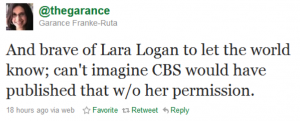By Caleb Files
News came out recently that Lara Logan, a CBS News correspondent, “suffered a brutal and sustained sexual assault and beating” while she was covering the Egyptian protests in Tahrir Square. It was pointed out on the social networking site, Twitter, by Garance Franke-Ruta:

This is a brave act on Logan’s part to come out as a victim of sexual assault, personally and professionally.
Concerns for women’s safety (some valid, some overblown) have long been used as an excuse to exclude women from all sorts of jobs and opportunities. It’s why women are technically banned from military combat positions. It’s why women still aren’t allowed to ski-jump in the Olympics. It’s one reason why there are so few women reporting from war zones and areas where there is political unrest. This discrimination of sorts creates a hard rhetorical line to walk: Some jobs are indeed more dangerous for women than for men. But women still have every right to hold those jobs, too. In fact, when it comes to many dangerous professions, it’s only by women’s inclusion that conditions can begin to change.
In a recent article Mac McClelland, the Human Rights Correspondent for Mother Jones, wrote about enrolling in self-defense classes as one way she had dealt with her Post Traumatic Stress Disorder after having been threatened while reporting on rape in Haiti. According to McClelland, Lara Logan’s assault is hardly unique since women reporters “often fail to bring it up and the journalism institution isn’t helping to facilitate the dialogue.”
These recent acts of violence cause us to ask: “Do reporters like Logan and McClelland face greater threats to their safety than male reporters do in similar situations?” Yes. But do they also, by dint of their gender, gain greater access to certain sources — and arguably do their job better?
Doing everything we can to ensure the safety of women reporters – and supporting them unambiguously when that safety has been threatened or violated – is important not only to protect women but to also promote their equity.